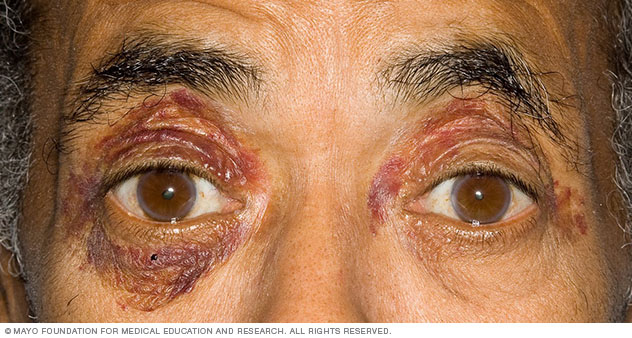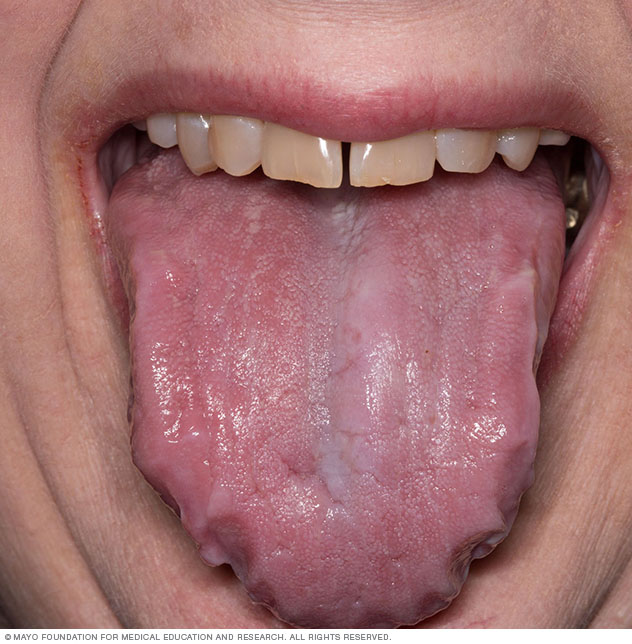Amyloidosis (am-uh-loi-DO-sis) is a rare disease that occurs when a protein called amyloid builds up in organs. This amyloid buildup can make the organs not work properly.
Organs that may be affected include the heart, kidneys, liver, spleen, nervous system and digestive tract.
Some types of amyloidosis occur with other diseases. These types may improve with treatment of the other diseases. Some types of amyloidosis may lead to life-threatening organ failure.
Treatments may include chemotherapy with strong drugs used to treat cancer. Other types of medications can reduce amyloid production and control symptoms. Some people may benefit from organ or stem cell transplants.
Symptoms
You may not experience symptoms of amyloidosis until later in the course of the disease. Symptoms may vary, depending on which organs are affected.
Signs and symptoms of amyloidosis may include:
- Severe fatigue and weakness
- Shortness of breath
- Numbness, tingling, or pain in the hands or feet
- Swelling of the ankles and legs
- Diarrhea, possibly with blood, or constipation
- An enlarged tongue, which sometimes looks rippled around its edge
- Skin changes, such as thickening or easy bruising, and purplish patches around the eyes
When to see a doctor
See your health care provider if you regularly experience any of the signs or symptoms associated with amyloidosis.

Some people with amyloidosis experience purpura — a condition in which small blood vessels leak blood into the skin. This most commonly occurs around the eyes but can also affect other parts of the body.

An enlarged tongue (macroglossia) can be a sign of amyloidosis. It can sometimes also appear rippled along its edge.
Causes
There are many different types of amyloidosis. Some types are hereditary. Others are caused by outside factors, such as inflammatory diseases or long-term dialysis. Many types affect multiple organs. Others affect only one part of the body.
Types of amyloidosis include:
- AL amyloidosis (immunoglobulin light chain amyloidosis). This is the most common type of amyloidosis in developed countries. AL amyloidosis is also called primary amyloidosis. It usually affects the heart, kidneys, liver and nerves.
- AA amyloidosis. This type is also known as secondary amyloidosis. It's usually triggered by an inflammatory disease, such as rheumatoid arthritis. It most commonly affects the kidneys, liver and spleen.
- Hereditary amyloidosis (familial amyloidosis). This inherited disorder often affects the nerves, heart and kidneys. It most commonly happens when a protein made by your liver is abnormal. This protein is called transthyretin (TTR).
- Wild-type amyloidosis. This variety has also been called senile systemic amyloidosis. It occurs when the TTR protein made by the liver is normal but produces amyloid for unknown reasons. Wild-type amyloidosis tends to affect men over age 70 and often targets the heart. It can also cause carpal tunnel syndrome.
- Localized amyloidosis. This type of amyloidosis often has a better prognosis than the varieties that affect multiple organ systems. Typical sites for localized amyloidosis include the bladder, skin, throat or lungs. Correct diagnosis is important so that treatments that affect the entire body can be avoided.
Risk factors
Factors that increase the risk of amyloidosis include:
- Age. Most people diagnosed with amyloidosis are between ages 60 and 70.
- Sex. Amyloidosis occurs more commonly in men.
- Other diseases. Having a chronic infectious or inflammatory disease increases the risk of AA amyloidosis.
- Family history. Some types of amyloidosis are hereditary.
- Kidney dialysis. Dialysis can't always remove large proteins from the blood. If you're on dialysis, abnormal proteins can build up in your blood and eventually be deposited in tissue. This condition is less common with more modern dialysis techniques.
- Race. People of African descent appear to be at higher risk of carrying a genetic mutation associated with a type of amyloidosis that can harm the heart.
Complications
Amyloidosis can seriously damage the:
- Heart. Amyloid reduces the heart's ability to fill with blood between heartbeats. Less blood is pumped with each beat. This can cause shortness of breath. If amyloidosis affects the heart's electrical system, it can cause heart rhythm problems. Amyloid-related heart problems can become life-threatening.
- Kidneys. Amyloid can harm the kidneys' filtering system. This affects their ability to remove waste products from the body. It can eventually cause kidney failure.
- Nervous system. Nerve damage can cause pain, numbness, or tingling of the fingers and feet. If amyloid affects the nerves that control bowel function, it can cause periods of alternating constipation and diarrhea. Damage to the nerves that control blood pressure can make people feel faint if they stand up too quickly.
Diagnosis
Amyloidosis is often overlooked because the signs and symptoms can mimic those of more-common diseases.
Early diagnosis can help prevent further organ damage. Precise diagnosis is important because treatment varies greatly, depending on your specific condition.
Laboratory tests
Blood and urine may be analyzed for abnormal protein that can indicate amyloidosis. People with certain symptoms may also need thyroid and kidney function tests.
Biopsy
A tissue sample can be checked for signs of amyloidosis. The biopsy may be taken from the fat under the skin on the abdomen or from bone marrow. Some people may need a biopsy of an affected organ, such as the liver or kidney. The tissue can be tested to see what type of amyloid is involved.
Imaging tests
Images of the organs affected by amyloidosis may include:
- Echocardiogram. This technology uses sound waves to create moving images that can show how well the heart is working. It can also show heart damage that can be specific to particular types of amyloidosis.
- Magnetic resonance imaging (MRI). MRI uses radio waves and a strong magnetic field to create detailed images of organs and tissues. These can be used to check the structure and function of the heart.
- Nuclear imaging. In this test, tiny amounts of radioactive material (tracers) are injected into a vein. This can reveal early heart damage caused by certain types of amyloidosis. It can also help distinguish between different types of amyloidosis, which can guide treatment decisions.
Treatment
There's no cure for amyloidosis. But treatment can help manage signs and symptoms and limit further production of amyloid protein. If the amyloidosis has been triggered by another condition, such as rheumatoid arthritis or tuberculosis, treating the underlying condition can be helpful.
Medications
- Chemotherapy. Some cancer drugs are used in AL amyloidosis to stop the growth of abnormal cells that produce the protein that forms amyloid.
- Heart medications. If your heart is affected, you may need to take blood thinners to reduce the risk of clots. You may also need medications to control your heart rate. Drugs that increase urination can reduce the strain on your heart and kidneys.
- Targeted therapies. For certain types of amyloidosis, drugs such as patisiran (Onpattro) and inotersen (Tegsedi) can interfere with the commands sent by faulty genes that create amyloid. Other drugs, such as tafamidis (Vyndamax, Vyndaqel) and diflunisal, can stabilize bits of protein in the bloodstream and prevent them from getting transformed into amyloid deposits.
Surgical and other procedures
- Autologous blood stem cell transplant. This procedure involves collecting your own stem cells from your blood through a vein and storing them for a short time while you have high-dose chemotherapy. The stem cells are then returned to your body via a vein. This treatment is most appropriate for people whose disease isn't advanced and whose heart isn't greatly affected.
- Dialysis. If your kidneys have been damaged by amyloidosis, you may need to start dialysis. This procedure uses a machine to filter wastes, salts and fluid from your blood on a regular schedule.
- Organ transplant. If amyloid deposits have severely damaged your heart or kidneys, you might need surgery to replace those organs. Some types of amyloid are formed in the liver, so a liver transplant could stop that production.
Preparing for an appointment
You may be referred to a doctor who specializes in blood disorders (hematologist).
What you can do
- Write down your symptoms, including any that may seem unrelated to the reason why you scheduled the appointment.
- Make a list of all your medications, vitamins and supplements.
- Write down your key medical information, including other conditions.
- Write down key personal information, including any recent changes or stressors in your life.
- Write down questions to ask your doctor.
- Ask a relative or friend to accompany you, to help you remember what the doctor says.
Questions to ask your doctor
- What's the most likely cause of my symptoms?
- What type of amyloidosis do I have?
- What organs are affected?
- What stage is my disease?
- What kinds of tests do I need?
- What kind of treatments do I need?
- Am I at risk of long-term complications?
- What types of side effects can I expect from treatment?
- Do I need to follow any dietary or activity restrictions?
- I have another health condition. How can I best manage them together?
In addition to the questions that you've prepared to ask your doctor, don't hesitate to ask other questions during your appointment.
What to expect from your doctor
Your doctor is likely to ask you a number of questions. Being ready to answer them may provide time to go over points you want to spend more time on. You may be asked:
- When did you first begin experiencing symptoms? How severe are they, and are they continuous or occasional?
- Does anything seem to make your symptoms better or worse?
- How is your appetite? Have you recently lost weight without trying?
- Have you experienced any leg swelling?
- Have you experienced shortness of breath?
- Are you able to work and perform normal daily tasks? Are you often tired?
- Have you noticed that you bruise easily?
- Has anyone in your family ever been diagnosed with amyloidosis?
Copyright © 1998-2026 Mayo Foundation for Medical Education and Research (MFMER). All rights reserved.